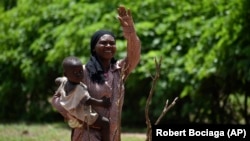There is little doubt that investments in global health protect people everywhere. It saves lives in countries beset by endemic diseases and issues particular to weak health care systems. It strengthens fragile states and promotes social and economic progress. And it helps to prevent the global spread of infectious illnesses through early detection and intervention.
One of the greatest stories of the past century is the enormous increase of human life expectancy. “At the start of the last century, the average human life expectancy was in the mid-thirties,” said U.S. Agency for International Development Administrator Samantha Power in a speech last year. “Today, it is more than seventy.”
The story, she said, “starts with a series of remarkable scientific innovations.”
“Because of that global effort to extend humanity’s greatest lifesaving innovations to the furthest reaches of the planet, in the last thirty years alone, maternal mortality fell by 40 percent, child mortality fell by 60 percent – and the world’s average life expectancy climbed up to the mid-seventies.”
“Global health works, it just works,” said Administrator Power.
That is why USAID invests in health systems, their strengthening, and breakthrough innovation, with a focus around three strategic priorities: Preventing child and maternal deaths; controlling the HIV/AIDS epidemic; and combating infectious diseases.
In early November, USAID announced further investment in two of these priorities. First, the new Strengthening Infectious Disease Detection Systems project will boost the capacity of partner countries to prevent, detect, and respond to the increasing occurrence and severity of infectious disease threats. USAID works in over 50 countries to strengthen specific components necessary for strong global health security and pandemic preparedness.
Second, USAID is providing an additional $26.7 million to the Global Financing Facility. The GFF is a World Bank-hosted, country-led partnership, which advances the health and rights of women, children and adolescents by supporting countries as they strengthen their health systems and improve access to care, including for pregnant women, new mothers and babies.
Countries with health systems anchored in a strong health workforce are proven to deliver better results, expand service coverage, and lower maternal and child mortality from a variety of preventable causes. USAID is working with country partners to strengthen health systems to effectively reduce inequities in life expectancy and build resilience against health threats.






